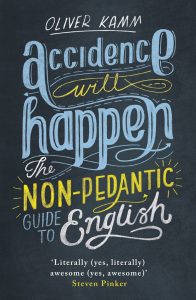
UP
Who (or ‘whom’?) to follow? Kamm or Gwynne?
A few weeks ago I handed in my finished typescript for an e-grammar course to the Publishing Training Centre (PTC). The PTC is an agency I’ve had the good fortune to work with for some time now, and the e-grammar course is an electronic expansion of two courses I’ve run for them, on and off, over the last ten years. They’ve always been tricky affairs, these courses: people come on them mostly with feelings of inadequacy and a sense that they know nothing like as much about the rules of grammar as their line managers or writers do, and often what they want is a set of rules that they can apply when they get back to their desks. I’m never entirely comfortable telling them that most of the rules they’ve heard about or dimly remember from school are not, and never were, carved in stone (though that is what I believe, and what I usually say) because they are so clearly in need of guidelines, structures, support that – if I do so – there is a danger they will be even more at a loss than they were before. As a result, and in a way that occasionally makes me feel mealy-mouthed, we talk about current consensuses, stylistic choices, the difference between formal and informal writing, the way in which we code-switch to suit different listeners and should do so in writing as well – and I hope that they leave with greater confidence in their use of language.
And then, just after I’d handed the typescript in, I read Oliver Kamm’s brilliant Accidence Will Happen: The Non-Pedantic Guide to English – and immediately wished I could reclaim my text and start again from scratch!

Kamm’s book, which I cannot recommend highly enough, is the best riposte I have yet come across to the grammatical prescriptivists best (or worst) represented by Nevile Gwynne, author of Gwynne’s Grammar. These prescriptivists, riding on a wave of support bolstered by the likes of Prince Charles and Michael Gove, feed on the insecurities of people who have left formal education without a clear understanding of what is and what is not acceptable in written English. Unaware of having ever had any formal instruction in grammar and punctuation, such people leave schools and colleges (and, of course, universities) confused about the distinction between ‘less’ and ‘fewer’, uncertain about starting sentences with ‘and’ or ‘but’, and with any number of other insecurities in terms of their use of English. And, of course, they become easy prey for the likes of Gwynne, who tell them in no uncertain terms that there is only one way of doing things and that there are sound philosophical/linguistic/historical/grammatical reasons why they should indeed worry about the split infinitive despite what the pinko liberals say, and that if they follow the prescriptivists’ grammatical precepts, not only will their writing improve, but so too will their thinking and, in fact (Gwynne really does make this kind of claim!), the whole of western civilisation will be saved.
It’s dangerously seductive stuff, the grammatical equivalent of political totalitarianism, offering rigid certainties and inflexible rules where the ‘liberals’ appear to offer only a confusing ‘do what feels right’ relativism. And clearly, commercially at the very least, the prescriptivists seem to be winning. There is a greater public appetite, it would appear, for the ‘rules are rules’ book than there is for Kamm’s more sensible ‘those rules were never rules’ approach – or maybe publishers are lazy and find it easier to publish for this linguistic lack of confidence than to have more rational explorations of the linguistic landscape.
But I would urge everyone to buy Kamm’s book rather than Gwynne’s, even though it is unlikely to be piled up from the floor at the check-out till in the way that Gwynne’s Grammar has been. Like the impeccable David Crystal’s The Fight for English before it, Accidence Will Happen gleefully destroys the historical and linguistic case for all these rules, demonstrating that they were the arbitrary invention of inexpert flat-earthers two or three hundred years ago and proposing beyond any possible rebuff that language is shaped and determined by the way in which people use it, and that that is a better guide than any set of precepts handed down by people who refuse to accept that change happens or that there is any possible way of doing things other than their own.
So yesterday I trudged into the PTC’s offices and asked them, even as they were preparing to make the e-grammar course live, to add Kamm’s book to the book list. I no longer think that his book invalidates the course that I’ve written (and I urge you, dear reader, to check the course out at the earliest opportunity: it is, of course, brilliant!), and I’m glad to take issue with some of the things he says (I can’t go along with, or maybe I can’t fully understand, his contention that there is nothing wrong with ‘between you and I’, for example), but, if there’s going to be a book I give many of my friends this year, it’s definitely going to be Accidence Will Happen. You have been warned (all three of you).

